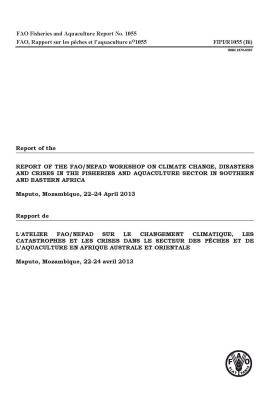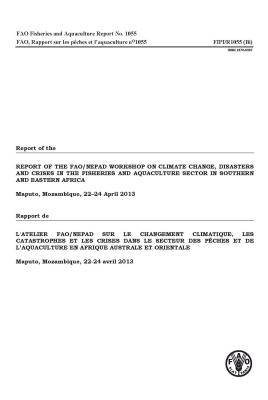
Door een staking bij bpost kan je online bestelling op dit moment iets langer onderweg zijn dan voorzien. Dringend iets nodig? Onze winkels ontvangen jou met open armen!
- Afhalen na 1 uur in een winkel met voorraad
- Gratis thuislevering in België vanaf € 30
- Ruim aanbod met 7 miljoen producten
Door een staking bij bpost kan je online bestelling op dit moment iets langer onderweg zijn dan voorzien. Dringend iets nodig? Onze winkels ontvangen jou met open armen!
- Afhalen na 1 uur in een winkel met voorraad
- Gratis thuislevering in België vanaf € 30
- Ruim aanbod met 7 miljoen producten
Zoeken
Report of the Fao/Nepad Workshop on Cimate Change, Disasters and Crises in the Fisheries and Aquaculture Sector in Southern and Eastern Africa Maputo, Mozambique 22-24 April 2013
Fao Fisheries and Aquaculture Report No. 1055
Food and Agriculture Organization of the United Nations
€ 39,45
+ 78 punten
Omschrijving
The purpose of the regional Workshop on Climate Change, Disasters and Crises in the Fisheries and Aquaculture Sector in Southern and Eastern Africa was to determine the gaps in adaptation and disaster risk management strategies, policies and activities that aim to assist fishers, fish farmers, fish workers and the communities they live in to improve their resilience to the impacts of disasters and climate change, and to identify ways to address these gaps based on the experience of the participants.
The workshop was the second of two; the first focused on West and Central Africa. Together, they form part of the consultative process of Component C of the NEPAD-FAO Fish Program (NFFP). The workshop addressed three main questions with respect to the fisheries and aquaculture sector and the impacts of disasters and climate change: What are the effects and vulnerabilities of climate change and disasters to the sector? What has the sector done to adapt (and what can we learn from this)? What else can be done (and how) to reduce vulnerability and strengthen resilience, and how do we prioritize action to adapt to climate change and strengthen resilience? The workshop recommended disaster risk reduction and adaptation actions at the local, national and regional levels based on practical experiences and examples of actions that have worked, or not worked, in the past. The workshop outputs will be used to complement the mapping and gap-analysis paper that will, in turn, contribute to a work plan for Component C of the NFFP. The combined findings of this workshop and the mapping and gap analysis will be well placed to feed into the pan-African process of elaborating a comprehensive fisheries reform strategy and ensuring that climate change and disaster impacts are addressed for the fisheries and aquaculture sector.
The workshop was the second of two; the first focused on West and Central Africa. Together, they form part of the consultative process of Component C of the NEPAD-FAO Fish Program (NFFP). The workshop addressed three main questions with respect to the fisheries and aquaculture sector and the impacts of disasters and climate change: What are the effects and vulnerabilities of climate change and disasters to the sector? What has the sector done to adapt (and what can we learn from this)? What else can be done (and how) to reduce vulnerability and strengthen resilience, and how do we prioritize action to adapt to climate change and strengthen resilience? The workshop recommended disaster risk reduction and adaptation actions at the local, national and regional levels based on practical experiences and examples of actions that have worked, or not worked, in the past. The workshop outputs will be used to complement the mapping and gap-analysis paper that will, in turn, contribute to a work plan for Component C of the NFFP. The combined findings of this workshop and the mapping and gap analysis will be well placed to feed into the pan-African process of elaborating a comprehensive fisheries reform strategy and ensuring that climate change and disaster impacts are addressed for the fisheries and aquaculture sector.
Specificaties
Betrokkenen
- Auteur(s):
- Uitgeverij:
Inhoud
- Aantal bladzijden:
- 111
- Taal:
- Engels
- Reeks:
- Reeksnummer:
- nr. 1055
Eigenschappen
- Productcode (EAN):
- 9789250084169
- Verschijningsdatum:
- 10/09/2014
- Uitvoering:
- Paperback
- Formaat:
- Trade paperback (VS)
- Afmetingen:
- 152 mm x 229 mm

Alleen bij Standaard Boekhandel
+ 78 punten op je klantenkaart van Standaard Boekhandel
Beoordelingen
We publiceren alleen reviews die voldoen aan de voorwaarden voor reviews. Bekijk onze voorwaarden voor reviews.











